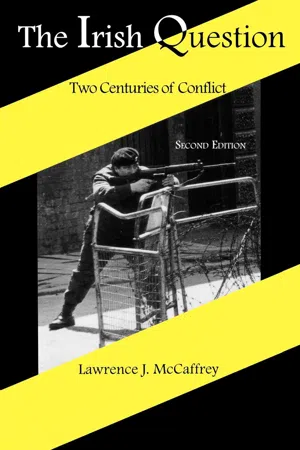
- 240 pages
- English
- ePUB (mobile friendly)
- Available on iOS & Android
About this book
The many dimensions of the Irish Question, 18001922, constituted the most emotion-laden problem in British politics, often to the detriment of other imperial interests—a Gordian knot only severed by the establishment of the Irish Free State in 1922. In this volume Lawrence J. McCaffrey presents a coherent view of the evolution of Irish nationalism since 1800 and the impact of the Irish Question on British culture, politics, and institutions.
The emotional nexus of the Irish Question was the religious issue, but McCaffrey believes that nationalism emerged from the attempt of the Irish Protestant minority, supported by Britain, to maintain religious, political, economic, and social ascendancy over a deprived and resentful majority. Although British concessions to Irish agitation removed many grievances—granting to Ireland virtual religious equality, along with substantial social, economic, and political reforms—nationalism, often frustrated in its attempts to secure reform and freedom, assumed an increasingly rigid position. Nationalists were not willing to settle for less than self-government, and as constitutional methods failed to achieve this goal, violence seemed the only other alternative.
The bitter dissensions created by the Irish Question left permanent marks upon British politics and institutions. The efforts of two Prime Ministers, Peel and Gladstone, to resolve the conflict split their parties, thus contributing to political confusion and instability. But the Irish nationalistBritish Liberal alliance achieved improvement in the condition of Ireland and speeded advancement of democracy in Britain. And the attempt of British politicians to deal with the economic and social aspects of the Irish Question undermined laissez faire and encouraged the progress of the welfare state in both islands. On the other hand, the challenge of Irish nationalism sustained and stimulated the no-Popery roots of British nativism, making it an influential factor in politics until early in the twentieth century.
The Irish Question, McCaffrey believes, has particular relevance in our contemporary world of emerging nations, wars of liberation, and tensions between majorities and minorities. Ireland offers an early example of the dreams of cultural nationalists becoming realities and of the sobering fact that ideological revolutionaries often make poor practical politicians.
Frequently asked questions
- Essential is ideal for learners and professionals who enjoy exploring a wide range of subjects. Access the Essential Library with 800,000+ trusted titles and best-sellers across business, personal growth, and the humanities. Includes unlimited reading time and Standard Read Aloud voice.
- Complete: Perfect for advanced learners and researchers needing full, unrestricted access. Unlock 1.4M+ books across hundreds of subjects, including academic and specialized titles. The Complete Plan also includes advanced features like Premium Read Aloud and Research Assistant.
Please note we cannot support devices running on iOS 13 and Android 7 or earlier. Learn more about using the app.
Information
Table of contents
- Cover
- Half title
- Title
- Copyright
- Dedication
- Contents
- Preface
- Introduction
- 1. Catholic Emancipation, 1800-1829
- 2. Repeal, 1829-1845
- 3. Famine, Revolution, Republicanism, 1845-1870
- 4. Home Rule, 1870-1880
- 5. Home Rule, 1880-1906
- 6. The Crises of Home Rule Nationalism, 1906-1914
- 7. The Rose Tree, 1914-1922
- 8. Unfinished Business, 1922-1994
- Conclusion
- Recommended Reading
- Index